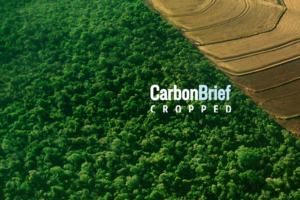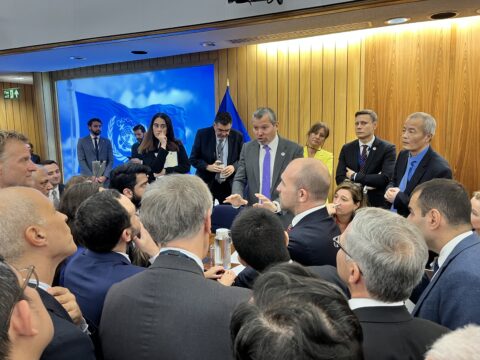Welcome to Carbon Brief’s Cropped.
We handpick and explain the most important stories at the intersection of climate, land, food and nature over the past fortnight.
This is an online version of Carbon Brief’s fortnightly Cropped email newsletter. Subscribe for free here.
Key developments
Europe focuses on biodiversity
‘WORSE THAN TERRORISM’: Climate change and biodiversity loss pose a more “fundamental threat” to the UK than terrorism or Vladimir Putin, UK foreign secretary David Lammy said in his first major policy address, the Independent reported. Giving a speech at London’s Kew Gardens, Lammy said that climate change and biodiversity loss “may not feel as urgent as a terrorist or an imperialist autocrat”, but they are “more fundamental…systemic…pervasive…and accelerating towards us”, the Independent said. The Financial Times said that Lammy pledged that climate change and biodiversity loss would be “central to all the Foreign Office does”, and that he will create “special representatives” in each area. The Guardian noted this will be the first time the UK has appointed a special envoy for nature.
RISE OF RIBERA: Elsewhere, Teresa Ribera, Spain’s ecological transition minister, has been appointed as EU commissioner Ursula von der Leyen’s second-in-command, with a “vast portfolio” including climate and competition policy, Politico reported. The Guardian said that the “outspoken” Ribera is to become one of six vice-presidents in the incoming EU executive led by von der Leyen, which is expected to start work at the end of the year. Euronews said that green activists have “breathed a sigh of relief” at the appointment.
AGRICULTURE COMMISSIONER: Von der Leyen has also appointed a new agricultural commissioner in Christophe Hansen, a Luxembourg MP from the centre-right Christian Social People’s party, the Irish Independent reported. According to the newspaper, von der Leyen has given Hansen “100 days to prepare a vision for the EU agriculture and food sectors”, tasking him with ensuring they are both competitive and “within the boundaries of our planet”. Portuguese news agency Lusa said that Portuguese farmers have “high expectations” that Hansen will prioritise the needs of agricultural workers. Elsewhere, DeSmog has mapped “Ireland’s powerful farming lobby”.
Australia’s deforestation hotspots
OUTLIERS: A new report from the environment and heritage department of the New South Wales government found that more than 45,000 hectares of native vegetation were cleared in 2022 to make way for farming, infrastructure and other projects. Nathaniel Pelle, a campaigner with the Australian Conservation Foundation, told the Sydney Morning Herald that Australia is an “outlier among wealthy countries for forest loss”. He added: “Europe has been historically cleared, Canada has been historically cleared, the US and Australia have been historically cleared, but what separates us from them is that we’re still doing it.” Deforestation in the state is “among [the] worst in the world”, the newspaper wrote.
‘ZOMBIE INDUSTRY’: The report showed that land clearing has been on the rise since 2015, when the previous government announced upcoming changes to its land-clearing laws, the outlet said. In a separate article, the Sydney Morning Herald called logging in the neighbouring state of Victoria the “‘zombie’ industry that won’t die”. According to the newspaper, “commercial logging officially ended” on 1 January, but timber mills “continue to process native hardwood timbers” – sourced from private landowners and from the government’s “fuel-reduction” wildfire-prevention strategies. The outlet wrote: “Environment groups say logging is now taking place without proper planning or oversight, leaving threatened species at risk.”
EPA ON THE AGENDA: Despite promises to “develop new nature legislation” and put nature “back on the priority list”, Australia’s Labor government – elected in May 2022 – “has not lived up to…early rhetoric” around nature protection, Adam Morton wrote in a column for the Guardian. Morton noted that the push to create a national environment agency, Environment Protection Australia, “look[s] to be in trouble”, as deals with either the Greens or the Coalition look unlikely. Writing in the Conversation, environmental-law expert Dr Justine Bell-James said: “All this is bad news for our threatened species and sick ecosystems. We know what needs to be done. But our government is showing worrying signs of letting industry and developers control their environmental agenda.”
Spotlight
Humans and polar bears collide at Earth’s Arctic research hub
In this spotlight, Carbon Brief reports from the Earth’s most-northerly human settlement, which is increasingly facing polar bear encounters amid rapid Arctic change.
Ask anyone living and working in Ny-Ålesund – the Earth’s most northern human settlement, located on the Norwegian archipelago of Svalbard in the Arctic Ocean – what they perceive to be the number one threat to their safety and they will each offer the same answer: polar bears.
A little more than 1,200km from the North Pole, the tiny Arctic town of Ny-Ålesund started life as a coal mining district in the early 20th century, but today operates solely as an international climate research hub, hosting about 60 scientists at its busiest time in the summer months.
The vast Arctic wilderness surrounding the town is home to one of the world’s largest permanent polar bear populations.
Protective measures
Ever since Ny-Ålesund’s inception, the company running logistics in the town has implemented strict protocols with the aim of protecting people from polar bears.
The few roads leading out of town are marked with polar bear hazard signs. Nearly every communal building in the town carries posters with instructions of what to do in the event of a polar bear sighting.
When researchers go out into the field to carry out their research, at least one of them must act as a “polar bear guard” – meaning they need to pass shooting practice and carry a rifle in case they need to kill a bear in an emergency.
“We are entering a habitat that is not ours,” Dorothea Moser, an ice cores researcher with the British Antarctic Survey, the UK’s polar research institute, told Carbon Brief. “With polar bear protection, we’re trying to protect both us as researchers and the polar bear.”
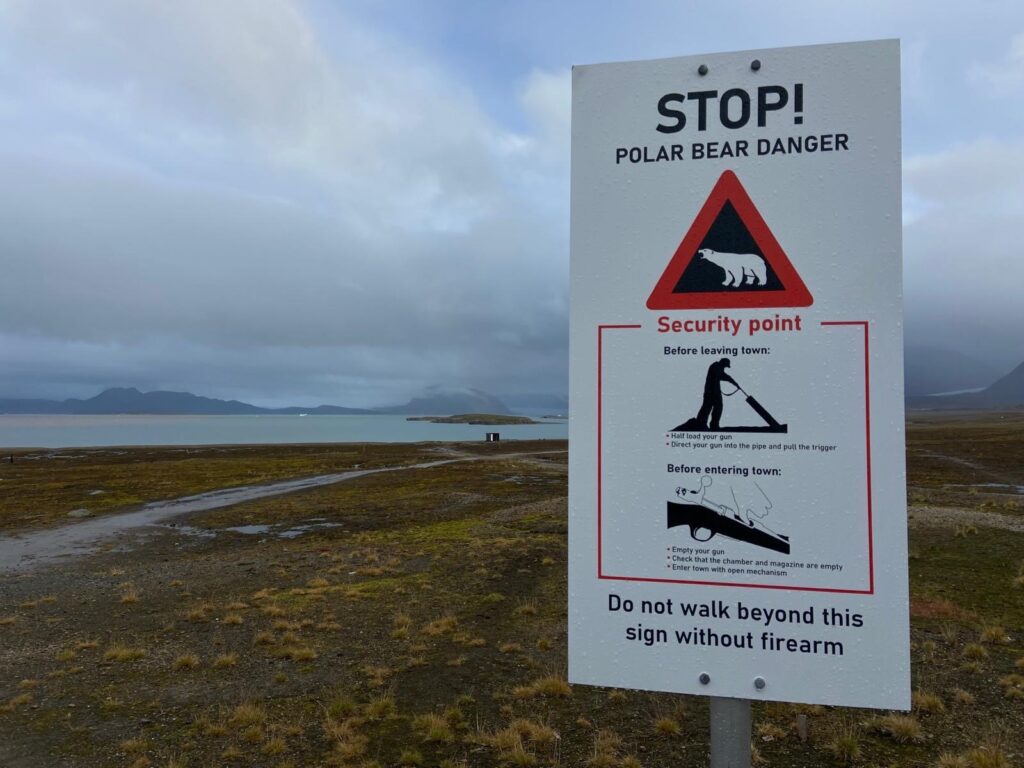
As part of the protective measures when out in the field, guards carry binoculars and constantly scan the environment around them. If they spot a bear on the horizon, the research team will immediately leave the area and notify the town.
If a polar bear is spotted within contact distance – the animals can run at speeds up to 25 miles per hour – then researchers will let off a flare in an attempt to scare it away.
“We can defend ourselves with flares, we’re scaring away the polar bear and creating more space between us in a defensive way,” Moser added. “Of course, we also have to carry a weapon, but we hope that we never have to use it. In the past 30 years, we have not had any lethal encounters.”
Rapid change
These strict measures have protected both scientists and bears for decades in Ny-Ålesund, but rapid change in the region could threaten this delicate balance.
Svalbard bears were nearly hunted to extinction in the 20th century. However, a ban was put in place in 1973, which saw numbers recover. Now, the Beaufort Sea subpopulation, which includes Svalbard bears, is considered “stable”.
However, climate change is causing Svalbard’s environment to shift rapidly, with temperatures rising seven times faster than the global average.
Rapid warming has had a devastating impact on sea ice, which blankets the Arctic Ocean in the cooler winter months before shrinking back at the height of summer. As the Earth warms, the extent of the sea ice in summer is becoming smaller every year.
This is a problem for polar bears, which use sea ice to hunt seals, their main source of prey. Research has found that the disappearance of sea ice is forcing bears to search further afield for food, sometimes bringing them closer towards human settlements.
Ingrid Kjerstad, research coordinator at the Norwegian Polar Institute in Ny-Ålesund, which oversees all scientific research in the town, told Carbon Brief that their records show the number of polar bears coming into contact with humans in the region has increased in recent years.
An increase in human-bear encounters is a worry for both researchers and wildlife. Although scientists in Ny-Ålesund have avoided shooting a bear, there have been several lethal incidents involving both human and animal fatalities in Svalbard’s capital of Longyearbyen.
The evidence of more human-bear encounters in Ny-Ålesund is still “anecdotal” and has not yet been published in a peer-reviewed science journal, Kjerstad added, but is yet another sign of how rapid environmental change is transforming life at Earth’s northern edge.
News and views
BIODIVERSITY FINANCE: Funding to help developing nations address biodiversity loss grew by more than $4bn in 2022, but mostly in the form of loans, rather than grants, according to new figures from the Organisation for Economic Cooperation and Development (OECD) reported by Climate Home News. The OECD report, which analysed the period from 2015 to 2022, showed that biodiversity funding grew from $11.1bn in 2021 to $15.4bn in 2022. Climate Home News added that the increase came largely from multilateral institutions – mainly development banks – which increased their funding from $2.7bn in 2021 to $5.7bn in 2022, “mostly by offering concessional loans, which are cheaper than borrowing on commercial terms”.
DAM IT: Dams around the world will struggle to cope with increasingly common severe rainfall, “leading to an increased likelihood of failure and risk of catastrophic flooding”, according to two researchers at the IHE Delft Institute for Water Education. They added that “it is not clear what climate and hydrological data was used to design” most of the world’s dams and spillways. Covering the IHE Delft commentary, Sudanese outlet Dabanga wrote that, due to a lack of preventative maintenance, the Jebel Aulia dam south of Khartoum “may lead to a failed agricultural season” this winter. It added: “A collapse of the dam also threatens people in Khartoum.”
CALI INCOMING: The COP16 nature summit will be a key “political moment and a very important moment for biodiversity”, UN biodiversity chief Astrid Schomaker told a press conference on 23 September. Unlike the previous summit, a number of high-profile politicians are due to attend the upcoming talks in Cali, Colombia – including Brazilian president Luiz Inácio Lula da Silva and Mexico’s president-elect, Dr Claudia Sheinbaum. There will also be a “very strong presence” of Indigenous peoples at the talks, Colombia’s environment minister, Susana Muhamad, told the press briefing. Muhamad also called on richer countries to put more money into the dedicated fund to support biodiversity goals. Meanwhile, Carbon Brief has updated its interactive tracker of national biodiversity strategies and action plans to include new submissions.
ECOCIDE RECOGNITION: Vanuatu has renewed its push to recognise “ecocide” – “the severe and reckless destruction of nature” – under the Rome Statute of the International Criminal Court, the Pacific Island News Association reported. The Pacific nation first proposed the addition of ecocide in 2019, the news outlet said, and its bid received a boost from a 2021 independent expert report that “outlined the legal framework for ecocide”. The article quoted Vanuatu’s UN ambassador, Odo Tevi, who said that existing laws protecting nature “are insufficient” and that the definition should “focu[s] on the severity of the outcome rather than specific prohibited behaviours”.
SHAPE UP OR SHIP OUT: Drought in South America is forcing grain shippers “to look for alternatives” as the water level on the Paraná River has dropped precipitously, the Argentine trade publication ArgenPorts reported. Argentine officials noted that while water levels are far below normal at present, the effects of the drought “will not be as cruel and harsh as the one that occurred from 2020 to 2022”. Elsewhere, the “unprecedented drought” in Ecuador has led to “mass power cuts”, forest fires and the declaration of a “red alert” in several parts of the country, according to MercoPress.
Watch, read, listen
FOOD FOR THOUGHT: In Scientific American, science historian Prof Naomi Oreskes argued that the Svalbard Global Seed Vault “illustrate[s] why we need to prevent climate disaster rather than plan for it”.
HISTORY REPEATS: Nigeria’s the Cable examined how a burst dam that displaced 400,000 people in Borno state 30 years ago has flooded once again amid extreme rainfall in the country.
CONTINUED STRUGGLE: Despite legal wins across the world, Indigenous peoples still face evictions from their lands and struggle to obtain the reparations promised to them, a Mongabay investigation found.
PESTICIDE LOOPHOLE: An investigation by Unearthed alleged that companies are exploiting loopholes in France’s landmark pesticide ban to ship growing amounts of harmful chemicals overseas.
New science
- Extreme permafrost thaw could lead to a “rapid intensification” of wildfires in western Siberia and Canada, said research in Nature Communications. Using a wide range of climate simulations, the study found that warming-driven rapid permafrost thaw could lead to “massive soil drying, surface warming and reduction of relative humidity”, which could in turn boost fires.
- Prioritising boosting carbon stores on agricultural land could draw down as much CO2 as global tree-planting by 2050 and provide farmers with hundreds of billions of dollars in economic benefits, a new Nature Food study found. The authors used an economic land-use model to project how boosting carbon in agriculture could benefit producers and the planet.
- New research in Environmental Research Letters found that the number of heatwave days affecting global cropland will increase nearly 4.5-fold by the end of the century under a medium-emissions scenario. Using observational data and climate models, researchers found “consistent increases” in the frequency and intensity of heatwaves affecting croplands in the future.
In the diary
- 10-30 September: 79th session of the UN General Assembly | New York
- 22-28 September: Climate Week NYC 2024 | New York
- 23-27 September: 20th meeting of the Persistent Organic Pollutants Review Committee to the Stockholm Convention | Rome
- 29 September: International day of awareness of food loss and waste
- 1-2 October: Forest Europe ministerial conference | Königswinter, Germany
- 8-10 October: Global Nature Positive Summit | Sydney
Cropped is researched and written by Dr Giuliana Viglione, Aruna Chandrasekhar, Daisy Dunne, Orla Dwyer and Yanine Quiroz. Please send tips and feedback to cropped@carbonbrief.org.
The post Cropped 25 September 2024: Biodiversity loss ‘worse than terrorism’; Human-polar bear conflict; Australia’s ‘zombie’ forestry appeared first on Carbon Brief.
Climate Change
DeBriefed 27 February 2026: Trump’s fossil-fuel talk | Modi-Lula rare-earth pact | Is there a UK ‘greenlash’?
Welcome to Carbon Brief’s DeBriefed.
An essential guide to the week’s key developments relating to climate change.
This week
Absolute State of the Union
‘DRILL, BABY’: US president Donald Trump “doubled down on his ‘drill, baby, drill’ agenda” in his State of the Union (SOTU) address, said the Los Angeles Times. He “tout[ed] his support of the fossil-fuel industry and renew[ed] his focus on electricity affordability”, reported the Financial Times. Trump also attacked the “green new scam”, noted Carbon Brief’s SOTU tracker.
COAL REPRIEVE: Earlier in the week, the Trump administration had watered down limits on mercury pollution from coal-fired power plants, reported the Financial Times. It remains “unclear” if this will be enough to prevent the decline of coal power, said Bloomberg, in the face of lower-cost gas and renewables. Reuters noted that US coal plants are “ageing”.
OIL STAY: The US Supreme Court agreed to hear arguments brought by the oil industry in a “major lawsuit”, reported the New York Times. The newspaper said the firms are attempting to head off dozens of other lawsuits at state level, relating to their role in global warming.
SHIP-SHILLING: The Trump administration is working to “kill” a global carbon levy on shipping “permanently”, reported Politico, after succeeding in delaying the measure late last year. The Guardian said US “bullying” could be “paying off”, after Panama signalled it was reversing its support for the levy in a proposal submitted to the UN shipping body.
Around the world
- RARE EARTHS: The governments of Brazil and India signed a deal on rare earths, said the Times of India, as well as agreeing to collaborate on renewable energy.
- HEAT ROLLBACK: German homes will be allowed to continue installing gas and oil heating, under watered-down government plans covered by Clean Energy Wire.
- BRAZIL FLOODS: At least 53 people died in floods in the state of Minas Gerais, after some areas saw 170mm of rain in a few hours, reported CNN Brasil.
- ITALY’S ATTACK: Italy is calling for the EU to “suspend” its emissions trading system (ETS) ahead of a review later this year, said Politico.
- COOKSTOVE CREDITS: The first-ever carbon credits under the Paris Agreement have been issued to a cookstove project in Myanmar, said Climate Home News.
- SAUDI SOLAR: Turkey has signed a “major” solar deal that will see Saudi firm ACWA building 2 gigawatts in the country, according to Agence France-Presse.
$467 billion
The profits made by five major oil firms since prices spiked following Russia’s invasion of Ukraine four years ago, according to a report by Global Witness covered by BusinessGreen.
Latest climate research
- Claims about the “fingerprint” of human-caused climate change, made in a recent US Department of Energy report, are “factually incorrect” | AGU Advances
- Large lakes in the Congo Basin are releasing carbon dioxide into the atmosphere from “immense ancient stores” | Nature Geoscience
- Shared Socioeconomic Pathways – scenarios used regularly in climate modelling – underrepresent “narratives explicitly centring on democratic principles such as participation, accountability and justice” | npj Climate Action
(For more, see Carbon Brief’s in-depth daily summaries of the top climate news stories on Monday, Tuesday, Wednesday, Thursday and Friday.)
Captured
The constituency of Richard Tice MP, the climate-sceptic deputy leader of Reform UK, is the second-largest recipient of flood defence spending in England, according to new Carbon Brief analysis. Overall, the funding is disproportionately targeted at coastal and urban areas, many of which have Conservative or Liberal Democrat MPs.
Spotlight
Is there really a UK ‘greenlash’?
This week, after a historic Green Party byelection win, Carbon Brief looks at whether there really is a “greenlash” against climate policy in the UK.
Over the past year, the UK’s political consensus on climate change has been shattered.
Yet despite a sharp turn against climate action among right-wing politicians and right-leaning media outlets, UK public support for climate action remains strong.
Prof Federica Genovese, who studies climate politics at the University of Oxford, told Carbon Brief:
“The current ‘war’ on green policy is mostly driven by media and political elites, not by the public.”
Indeed, there is still a greater than two-to-one majority among the UK public in favour of the country’s legally binding target to reach net-zero emissions by 2050, as shown below.
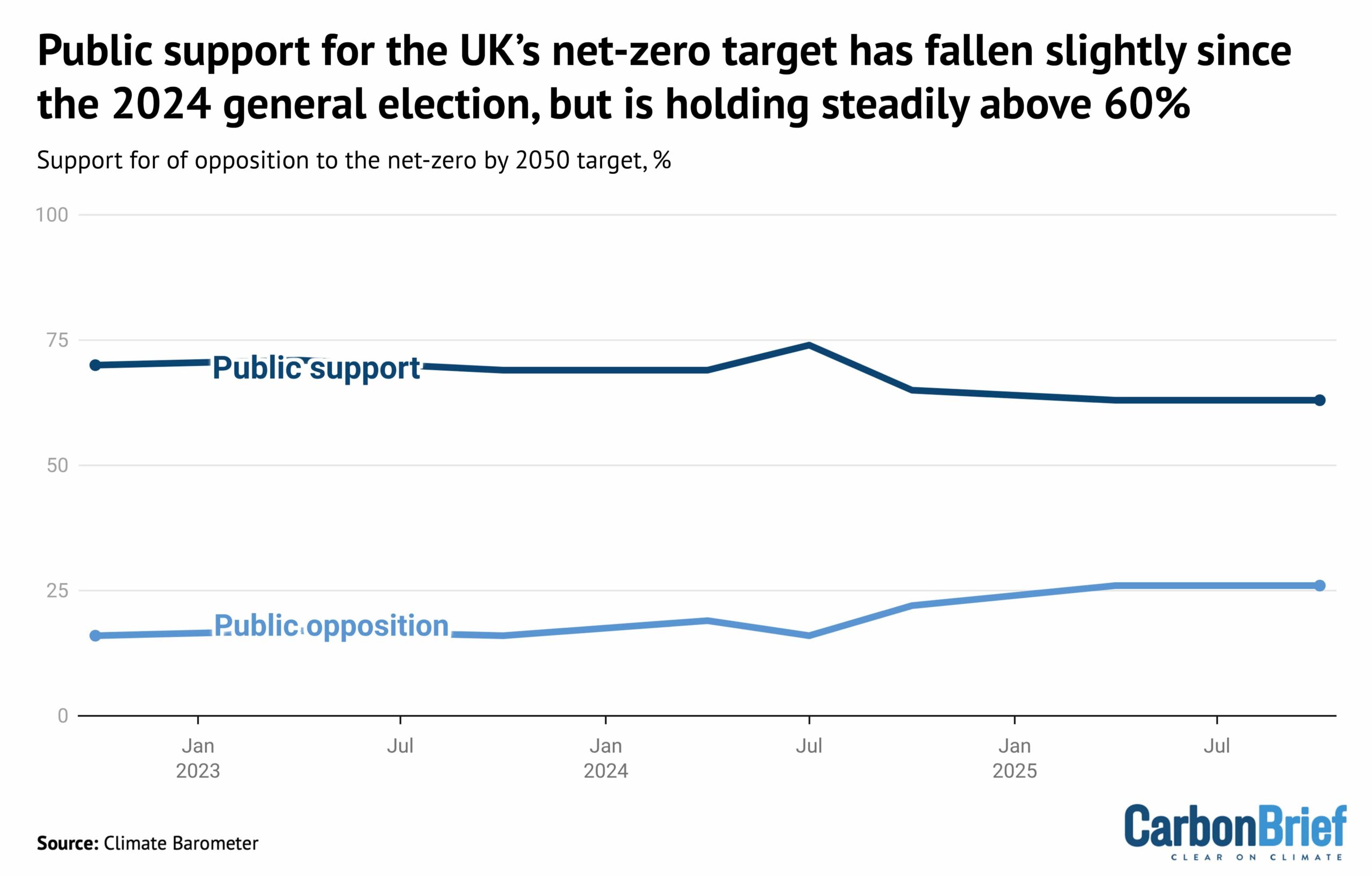
Steve Akehurst, director of public-opinion research initiative Persuasion UK, also noted the growing divide between the public and “elites”. He told Carbon Brief:
“The biggest movement is, without doubt, in media and elite opinion. There is a bit more polarisation and opposition [to climate action] among voters, but it’s typically no more than 20-25% and mostly confined within core Reform voters.”
Conservative gear shift
For decades, the UK had enjoyed strong, cross-party political support for climate action.
Lord Deben, the Conservative peer and former chair of the Climate Change Committee, told Carbon Brief that the UK’s landmark 2008 Climate Change Act had been born of this cross-party consensus, saying “all parties supported it”.
Since their landslide loss at the 2024 election, however, the Conservatives have turned against the UK’s target of net-zero emissions by 2050, which they legislated for in 2019.
Curiously, while opposition to net-zero has surged among Conservative MPs, there is majority support for the target among those that plan to vote for the party, as shown below.
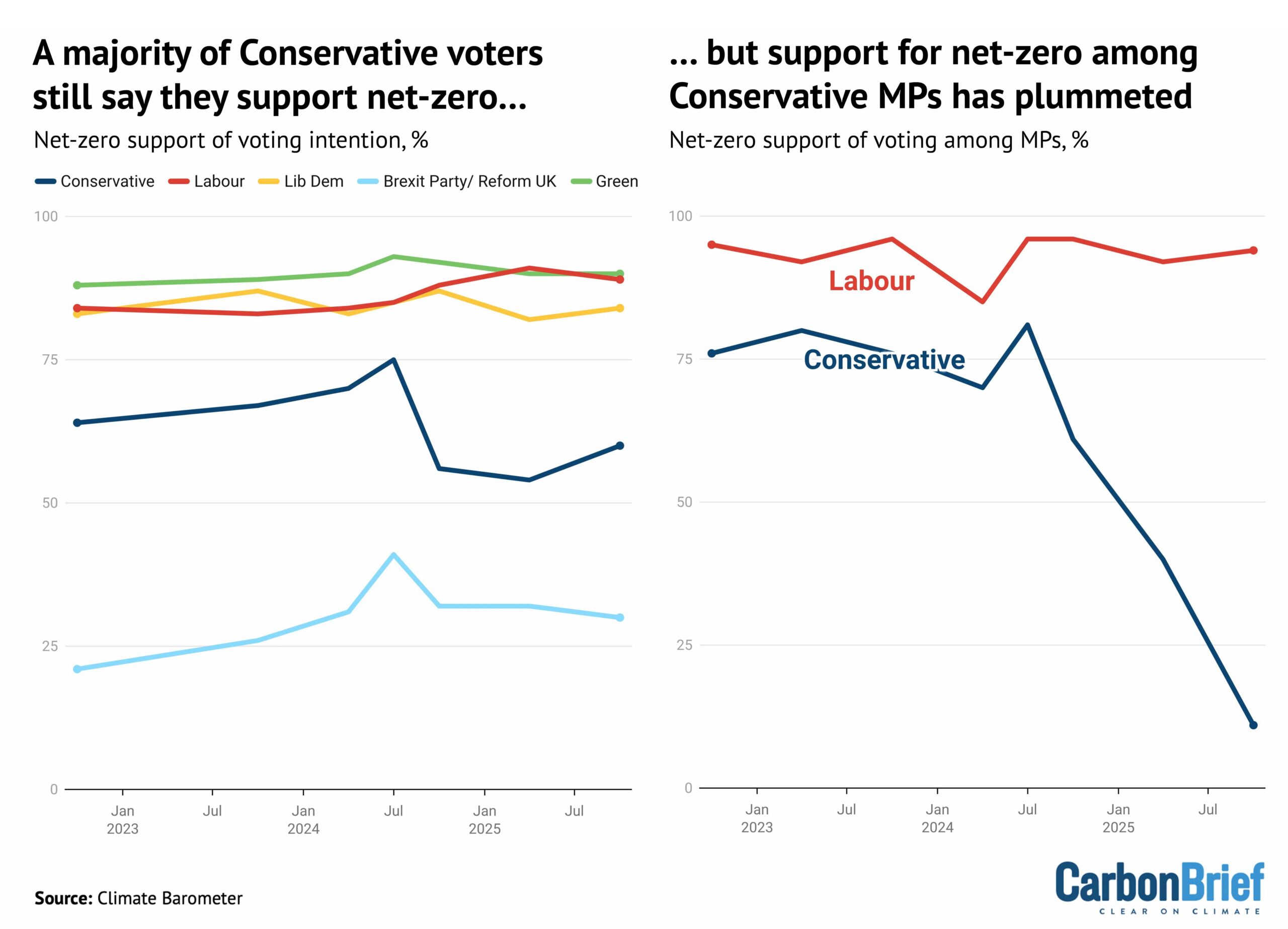
Dr Adam Corner, advisor to the Climate Barometer initiative that tracks public opinion on climate change, told Carbon Brief that those who currently plan to vote Reform are the only segment who “tend to be more opposed to net-zero goals”. He said:
“Despite the rise in hostile media coverage and the collapse of the political consensus, we find that public support for the net-zero by 2050 target is plateauing – not plummeting.”
Reform, which rejects the scientific evidence on global warming and campaigns against net-zero, has been leading the polls for a year. (However, it was comfortably beaten by the Greens in yesterday’s Gorton and Denton byelection.)
Corner acknowledged that “some of the anti-net zero noise…[is] showing up in our data”, adding:
“We see rising concerns about the near-term costs of policies and an uptick in people [falsely] attributing high energy bills to climate initiatives.”
But Akehurst said that, rather than a big fall in public support, there had been a drop in the “salience” of climate action:
“So many other issues [are] competing for their attention.”
UK newspapers published more editorials opposing climate action than supporting it for the first time on record in 2025, according to Carbon Brief analysis.
Global ‘greenlash’?
All of this sits against a challenging global backdrop, in which US president Donald Trump has been repeating climate-sceptic talking points and rolling back related policy.
At the same time, prominent figures have been calling for a change in climate strategy, sold variously as a “reset”, a “pivot”, as “realism”, or as “pragmatism”.
Genovese said that “far-right leaders have succeeded in the past 10 years in capturing net-zero as a poster child of things they are ‘fighting against’”.
She added that “much of this is fodder for conservative media and this whole ecosystem is essentially driving what we call the ‘greenlash’”.
Corner said the “disconnect” between elite views and the wider public “can create problems” – for example, “MPs consistently underestimate support for renewables”. He added:
“There is clearly a risk that the public starts to disengage too, if not enough positive voices are countering the negative ones.”
Watch, read, listen
TRUMP’S ‘PETROSTATE’: The US is becoming a “petrostate” that will be “sicker and poorer”, wrote Financial Times associate editor Rana Forohaar.
RHETORIC VS REALITY: Despite a “political mood [that] has darkened”, there is “more green stuff being installed than ever”, said New York Times columnist David Wallace-Wells.
CHINA’S ‘REVOLUTION’: The BBC’s Climate Question podcast reported from China on the “green energy revolution” taking place in the country.
Coming up
- 2-6 March: UN Food and Agriculture Organization regional conference for Latin America and Caribbean, Brasília
- 3 March: UK spring statement
- 4-11 March: China’s “two sessions”
- 5 March: Nepal elections
Pick of the jobs
- The Guardian, senior reporter, climate justice | Salary: $123,000-$135,000. Location: New York or Washington DC
- China-Global South Project, non-resident fellow, climate change | Salary: Up to $1,000 a month. Location: Remote
- University of East Anglia, PhD in mobilising community-based climate action through co-designed sports and wellbeing interventions | Salary: Stipend (unknown amount). Location: Norwich, UK
- TABLE and the University of São Paulo, Brazil, postdoctoral researcher in food system narratives | Salary: Unknown. Location: Pirassununga, Brazil
DeBriefed is edited by Daisy Dunne. Please send any tips or feedback to debriefed@carbonbrief.org.
This is an online version of Carbon Brief’s weekly DeBriefed email newsletter. Subscribe for free here.
The post DeBriefed 27 February 2026: Trump’s fossil-fuel talk | Modi-Lula rare-earth pact | Is there a UK ‘greenlash’? appeared first on Carbon Brief.
Climate Change
Pacific nations want higher emissions charges if shipping talks reopen
Seven Pacific island nations say they will demand heftier levies on global shipping emissions if opponents of a green deal for the industry succeed in reopening negotiations on the stalled accord.
The United States and Saudi Arabia persuaded countries not to grant final approval to the International Maritime Organization’s Net-Zero Framework (NZF) in October and they are now leading a drive for changes to the deal.
In a joint submission seen by Climate Home News, the seven climate-vulnerable Pacific countries said the framework was already a “fragile compromise”, and vowed to push for a universal levy on all ship emissions, as well as higher fees . The deal currently stipulates that fees will be charged when a vessel’s emissions exceed a certain level.
“For many countries, the NZF represents the absolute limit of what they can accept,” said the unpublished submission by Fiji, Kiribati, Vanuatu, Nauru, Palau, Tuvalu and the Solomon Islands.
The countries said a universal levy and higher charges on shipping would raise more funds to enable a “just and equitable transition leaving no country behind”. They added, however, that “despite its many shortcomings”, the framework should be adopted later this year.
US allies want exemption for ‘transition fuels’
The previous attempt to adopt the framework failed after governments narrowly voted to postpone it by a year. Ahead of the vote, the US threatened governments and their officials with sanctions, tariffs and visa restrictions – and President Donald Trump called the framework a “Green New Scam Tax on Shipping”.
Since then, Liberia – an African nation with a major low-tax shipping registry headquartered in the US state of Virginia – has proposed a new measure under which, rather than staying fixed under the NZF, ships’ emissions intensity targets change depending on “demonstrated uptake” of both “low-carbon and zero-carbon fuels”.
The proposal places stringent conditions on what fuels are taken into consideration when setting these targets, stressing that the low- and zero-carbon fuels should be “scalable”, not cost more than 15% more than standard marine fuels and should be available at “sufficient ports worldwide”.
This proposal would not “penalise transitional fuels” like natural gas and biofuels, they said. In the last decade, the US has built a host of large liquefied natural gas (LNG) export terminals, which the Trump administration is lobbying other countries to purchase from.
The draft motion, seen by Climate Home News, was co-sponsored by US ally Argentina and also by Panama, a shipping hub whose canal the US has threatened to annex. Both countries voted with the US to postpone the last vote on adopting the framework.
The IMO’s Panamanian head Arsenio Dominguez told reporters in January that changes to the framework were now possible.
“It is clear from what happened last year that we need to look into the concerns that have been expressed [and] … make sure that they are somehow addressed within the framework,” he said.
Patchwork of levies
While the European Union pushed firmly for the framework’s adoption, two of its shipping-reliant member states – Greece and Cyprus – abstained in October’s vote.
After a meeting between the Greek shipping minister and Saudi Arabia’s energy minister in January, Greece said a “common position” united Greece, Saudi Arabia and the US on the framework.
If the NZF or a similar instrument is not adopted, the IMO has warned that there will be a patchwork of differing regional levies on pollution – like the EU’s emissions trading system for ships visiting its ports – which will be complicated and expensive to comply with.
This would mean that only countries with their own levies and with lots of ships visiting their ports would raise funds, making it harder for other nations to fund green investments in their ports, seafarers and shipping companies. In contrast, under the NZF, revenues would be disbursed by the IMO to all nations based on set criteria.
Anais Rios, shipping policy officer from green campaign group Seas At Risk, told Climate Home News the proposal by the Pacific nations for a levy on all shipping emissions – not just those above a certain threshold – was “the most credible way to meet the IMO’s climate goals”.
“With geopolitics reframing climate policy, asking the IMO to reopen the discussion on the universal levy is the only way to decarbonise shipping whilst bringing revenue to manage impacts fairly,” Rios said.
“It is […] far stronger than the Net-Zero Framework that is currently on offer.”
The post Pacific nations want higher emissions charges if shipping talks reopen appeared first on Climate Home News.
Pacific nations want higher emissions charges if shipping talks reopen
Climate Change
Doubts over European SAF rules threaten cleaner aviation hopes, investors warn
Doubts over whether governments will maintain ambitious targets on boosting the use of sustainable aviation fuel (SAF) are a threat to the industry’s growth and play into the hands of fossil fuel companies, investors warned this week.
Several executives from airlines and oil firms have forecast recently that SAF requirements in the European Union, United Kingdom and elsewhere will be eased or scrapped altogether, potentially upending the aviation industry’s main policy to shrink air travel’s growing carbon footprint.
Such speculation poses a “fundamental threat” to the SAF industry, which mainly produces an alternative to traditional kerosene jet fuel using organic feedstocks such as used cooking oil (UCO), Thomas Engelmann, head of energy transition at German investment manager KGAL, told the Sustainable Aviation Fuel Investor conference in London.
He said fossil fuel firms would be the only winners from questions about compulsory SAF blending requirements.
The EU and the UK introduced the world’s first SAF mandates in January 2025, requiring fuel suppliers to blend at least 2% SAF with fossil fuel kerosene. The blending requirement will gradually increase to reach 32% in the EU and 22% in the UK by 2040.
Another case of diluted green rules?
Speaking at the World Economic Forum in Davos in January, CEO of French oil and gas company TotalEnergies Patrick Pouyanné said he would bet “that what happened to the car regulation will happen to the SAF regulation in Europe”.
The EU watered down green rules for car-makers in March 2025 after lobbying from car companies, Germany and Italy.
“You will see. Today all the airline companies are fighting [against the EU’s 2030 SAF target of 6%],” Pouyanne said, even though it’s “easy to reach to be honest”.
While most European airline lobbies publicly support the mandates, Ryanair Group CEO Michael O’Leary said last year that the SAF is “nonsense” and is “gradually dying a death, which is what it deserves to do”.
EU and UK stand by SAF targets
But the EU and the British government have disputed that. EU transport commissioner Apostolos Tzitzikostas said in November that the EU’s targets are “stable”, warning that “investment decisions and construction must start by 2027, or we will miss the 2030 targets”.
UK aviation minister Keir Mather told this week’s investor event that meeting the country’s SAF blending requirement of 10% by 2030 was “ambitious but, with the right investment, the right innovation and the right outlook, it is absolutely within our reach”.
“We need to go further and we need to go faster,” Mather said.

SAF investors and developers said such certainty on SAF mandates from policymakers was key to drawing the necessary investment to ramp up production of the greener fuel, which needs to scale up in order to bring down high production costs. Currently, SAF is between two and seven times more expensive than traditional jet fuel.
Urbano Perez, global clean molecules lead at Spanish bank Santander, said banks will not invest if there is a perceived regulatory risk.
David Scott, chair of Australian SAF producer Jet Zero Australia, said developing SAF was already challenging due to the risks of “pretty new” technology requiring high capital expenditure.
“That’s a scary model with a volatile political environment, so mandate questioning creates this problem on steroids”, Scott said.
Others played down the risk. Glenn Morgan, partner at investment and advisory firm SkiesFifty, said “policy is always a risk”, adding that traditional oil-based jet fuel could also lose subsidies.


Asian countries join SAF mandate adopters
In Asia, Singapore, South Korea, Thailand and Japan have recently adopted SAF mandates, and Matti Lievonen, CEO of Asia-based SAF producer EcoCeres, predicted that China, Indonesia and Hong Kong would follow suit.
David Fisken, investment director at the Australian Trade and Investment Commission, said the Australian government, which does not have a mandate, was watching to see how the EU and UK’s requirements played out.
The US does not have a SAF mandate and under President Donald Trump the government has slashed tax credits available for SAF producers from $1.75 a gallon to $1.
Is the world’s big idea for greener air travel a flight of fancy?
SAF and energy security
SAF’s potential role in boosting energy security was a major theme of this week’s discussions as geopolitical tensions push the issue to the fore.
Marcella Franchi, chief commercial officer for SAF at France’s Haffner Energy, said the Canadian government, which has “very unsettling neighbours at the moment”, was looking to produce SAF to protect its energy security, especially as it has ample supplies of biomass to use as potential feedstock.
Similarly, German weapons manufacturer Rheinmetall said last year it was working on plans that would enable European armed forces to produce their own synthetic, carbon-neutral fuel “locally and independently of global fossil fuel supply chain”.
Scott said Australia needs SAF to improve its fuel security, as it imports almost 99% of its liquid fuels.
He added that support for Australian SAF production is bipartisan, in part because it appeals to those more concerned about energy security than tackling climate change.
The post Doubts over European SAF rules threaten cleaner aviation hopes, investors warn appeared first on Climate Home News.
Doubts over European SAF rules threaten cleaner aviation hopes, investors warn
-
Greenhouse Gases7 months ago
Guest post: Why China is still building new coal – and when it might stop
-
Climate Change7 months ago
Guest post: Why China is still building new coal – and when it might stop
-

 Greenhouse Gases2 years ago
Greenhouse Gases2 years ago嘉宾来稿:满足中国增长的用电需求 光伏加储能“比新建煤电更实惠”
-
Climate Change2 years ago
Bill Discounting Climate Change in Florida’s Energy Policy Awaits DeSantis’ Approval
-
Climate Change2 years ago
Spanish-language misinformation on renewable energy spreads online, report shows
-

 Climate Change2 years ago
Climate Change2 years ago嘉宾来稿:满足中国增长的用电需求 光伏加储能“比新建煤电更实惠”
-
Climate Change Videos2 years ago
The toxic gas flares fuelling Nigeria’s climate change – BBC News
-

 Carbon Footprint2 years ago
Carbon Footprint2 years agoUS SEC’s Climate Disclosure Rules Spur Renewed Interest in Carbon Credits

